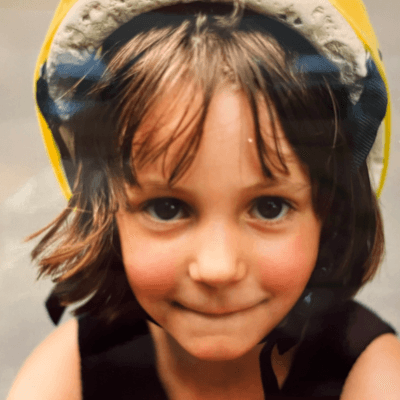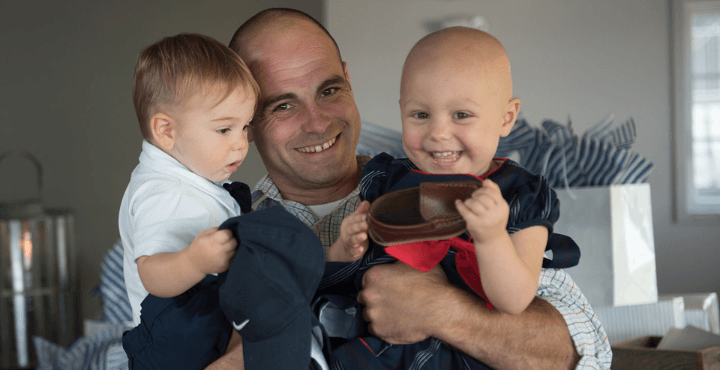
Most Love Bus supporters know that Lucy’s Love Bus was born from a child’s dream - Lucy Grogan’s dream - but many don’t know the child behind the dream. Since May is Lucy’s birthday month - she would be 29 this year - we are proud to introduce you to the guiding force behind Lucy’s Love Bus.
Meet Lucy, your May Butterfly Buddy! Lucy was the oldest sibling to Willow and Eli, and the daughter of Beecher and Rick Grogan. She was an old soul from the start; an intense child with a strong sense of self, who always held her head high. She knew who she was and proudly marched to the beat of her own drum. She was known for her spunk, humor, creativity, and her love of babies and animals.
One summer, soon after turning 8 years old, Lucy experienced ten days of seemingly unrelated health issues. She began limping on her left leg, but since her mom had just had a hip replacement, her teachers chalked it up to sympathy pains. She had strep throat that wouldn’t go away. She got a stiff neck, serious enough to get a muscle relaxer from her doctor. But alarm bells rang when Lu came home from school one afternoon with pale lips. Beecher, worried that her daughter had lyme disease, took her to the pediatrician’s office where Lucy’s nurse practitioner ordered multiple blood tests. Late that night, Beecher received the call that no parent ever wants to get. She was told to bring Lucy to a Boston hospital immediately and, after pressing the doctor for more information, found out that they thought that Lucy had leukemia.
Beecher remembers, “We just went. There was no time to pack, feel, or think. It felt like the bottom of my world fell out. You just get ripped out of your life, everything changes in a split second.”
At 3am, at the Boston Children’s Hospital emergency room, Lucy was diagnosed with acute myeloid leukemia (AML), one of the most fatal types of blood and bone marrow cancer. At the time, the 5-year survival rate for a child with AML was fifty percent (it has since gone up to sixty percent), and Beecher recalls envisioning the toss of a coin, saying “I knew that I could be the best advocate for Lucy that I could possibly be, but there was still a very real chance that it wouldn’t matter. I had to let go of control, and learned to focus on the one thing I could impact, which was her day to day quality of life.”
The doctors in the ER explained the diagnosis to Beecher and Lucy. Beecher couldn’t stop her tears, but Lucy didn’t cry. The intensity she carried through her childhood seemed to dissipate in that moment. She listened to the doctors with an ease and calm beyond her years, and told her mom, “stop crying, Mama. I’m going to be fine.”
Beecher learned to live by her now favorite phrase, ‘follow the child,’ stating, “Lucy always knew exactly what she needed, and what her body could tolerate. She listened to her body, so I made sure to always listen, too.”
Beecher and Lucy moved into Boston Children’s Hospital for months at a time. Because Rick’s job provided their health insurance, he worked full time while Beecher spent six nights each week at the hospital and he would take a shift for one night of the week. Willow was supported at home by her dad, and a rotating group of Beecher’s mama friends.
“Our community really stepped up when Lucy was sick. From home cooked meals to care packages, to fundraisers, we felt so loved and embraced during a time when our world fell apart,” Beecher said.
Spending eleven months in the hospital through six rounds of chemotherapy, Lucy found ways to survive the trauma of treatment. She was very friendly, and had a unique sense of humor, making friends easily. She found the babies on the unit, and loved to help take care of them. She also discovered integrative therapies; at the hospital, she spent lots of time in the hospital’s art room, and at home she received acupuncture, massage, chiropractic care, and Reiki to help ease her pain and suffering during treatment. Lucy’s unlimited access to integrative therapies was made possible by the funds that were raised for Lucy through the greater Amesbury community, and would later set the stage for her vision for Lucy’s Love Bus.
After Lucy turned 9, she was declared to be in remission. However, the time at home wasn’t easy; Lucy left the hospital with a severe case of OCD, survivor's guilt, and serious depression. When she was bullied at public school for her OCD, Rick and Beecher moved her to Sparhawk, a private school in Amesbury. At Sparhawk, Lucy got her wish to be treated like a normal child, and she thrived. At one point, Beecher quietly celebrated when the Headmaster’s Assistant called to say that Lucy got in trouble at school. Lucy’s spirit had been crushed by treatment, and all of the losses she had already accumulated in her short life, so when she was caught hiding in the woods, throwing rocks at the boys, Beecher rejoiced- knowing that her daughter’s spark and spunk were back!
Beecher, Rick, and Willow got to have the old Lucy back for a year before her cancer relapsed; she was nearing the age of eleven, Willow was six, and Beecher was pregnant with Eli. Lucy had to have total body radiation and high doses of chemo to kill her bone marrow in preparation for a bone marrow transplant. Lucy had to have four radiation treatments that would not only kill the bone marrow, but would kill Lucy’s fertility as well. The night before she started radiation, Lucy told Beecher that she would not be able to sit still for radiation while they “killed her babies.” She had the foresight to know that she would need to be sedated during radiation. The hospital staff had a really hard time believing that a 10-year-old could care so much about her fertility, but Lucy did. Beecher had scoured the internet, and learned that there was no way to preserve Lucy’s fertility, but she was able to advocate for her daughter to be sedated during the heartbreak of radiation.
Lucy then had a bone marrow transplant from an unrelated donor, and spent 100 days in the hospital waiting for the graft - the new marrow from the donor - to kick in. Unfortunately, Lucy became one of the ten percent of people who get chronic graft vs. host disease. The new immune system started attacking her skin and then it moved on to attack each of her organs - her heart, lungs, liver. Each attack was countered with months of high dose steroids, which wreak havoc on one’s mental health and body, especially a small body. While Lucy persevered through these excruciating cycles for 18 months, she never got her spark back. Lucy joined her 22 friends from the hospital and left this world on July 21st of 2006.
The story of Lucy’s Love Bus starts with Lucy, and her wisdom and lived experience are still at the center of each decision the organization makes today. Lucy was adamant that at Lucy's Love Bus, the needs of children would come first- always. We’re thankful to our community of supporters for following the child- trusting the child, and investing in Lucy’s Love Bus so we can continue to innovate for children who are suffering right now- children for whom a cure might come too late.
Beecher recounts, “I was so proud of Lucy every minute of her life. I’m proud of the caregiver she was. I’m proud of what a strong sense of self she had. I’m proud that her legacy of care and compassion lives on through Lucy’s Love Bus. She was a force to be reckoned with, and I know that she would be so honored by the tremendous love and comfort that is generated for children in her name.”
One week before her death, Lucy made one final art project in the hospital’s play room - a Japanese paper mobile- and asked her mom to write these words on it: “Let love in. Live life with love.”
Thanks to all of you, we do. We will.
Keep Lucy’s Love and Light alive by joining our Butterfly Effect today!

